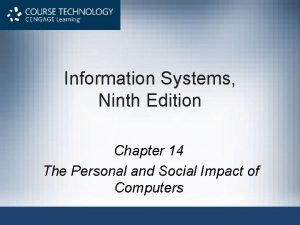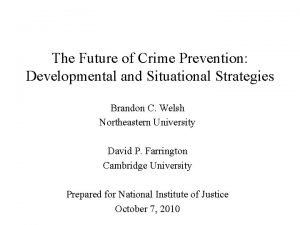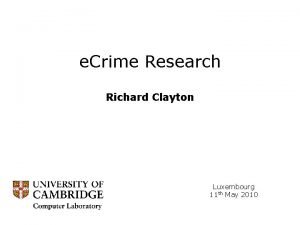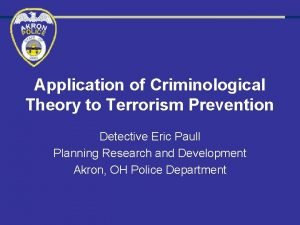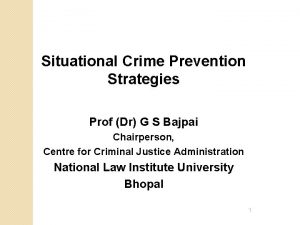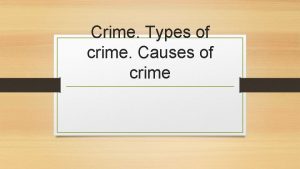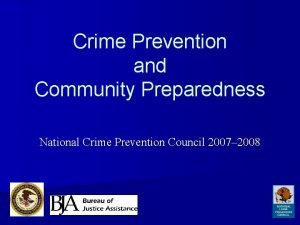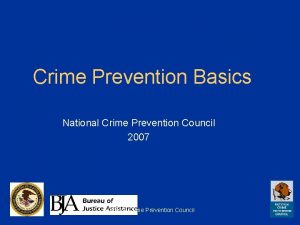CrimePolicePunishment Vicky Crossley Crime Prevention Clarke Clarke focused









- Slides: 9

Crime/Police/Punishment Vicky Crossley

Crime Prevention - Clarke • Clarke focused on situational crime prevention. • “People will commit offences when the costs of offending are less than the benefits obtained by offending. ” • Rather than increase punishment he argued it better to make it more difficult to commit crime. • Foucault – prison and community punishment can be combined as the state extending its tentacles of discipline and control.

Styles of Policing in the UK! Neighbourhood Watch • Teams of police and community support officers work in a geographical area. • The aim is to get to know the members of the community and respond to their specific concerns. Reactive Policing • Police respond to emergency calls from the public to help.

Police and Society Relationship! • Consensual Approach! • - Sees police having a close relationship with local area. Role of police being to represent the interests of the majority of law-abiding citizens. Individual offenders caught as a result of complaints made by community. Neighbourhood and reactive policing reflect the balance of police work.

• Conflict Approach! • - Provided by Scraton – The Police = An occupying force imposed upon working class and ethnic minority communities. These areas are largely patrolled. Imposed law reflects the interest of powerful groups. • Late-Modern Approach! (Foucalt, Cohen + Feeley) • - They would argue that the shift towards neighbourhood policing represents an extension of control over the population.

Police Discretion! • The police need to use discretion in deciding exactly which laws to apply and in what circumstances. • Reiner Three ways of explaining the basics of police discretion.

• 1. Individualistic – the explanation for police discretion is that a specific police officer has specific concerns and interests. Thus interprets law according to them. • 2. Cultural – Police mostly white and male. Work long hours in each other’s company. Develop occupational/canteen culture. Skolnick has 3 main components… 1. Suspiciousness 2. Internal solidarity + social isolation 3. Conservatism 4. Masculinity – Graef (1989)

• 3. Structural – derived from Marxism. Law biased in favour of powerful groups. Therefore, any upholding of law involved upholding capitalist values of society.

The Courts! • Magistrates Courts – Magistrates are volunteers drawn from local communities. However, when Morgan and Russel explored backgrounds of magistrates they found… • Equal gender balance. • 40% of magistrates over retirement age. • 70% held/previously held professional or managerial positions. • Senior judges background = overwhelmingly male, white and educated.
 Primary prevention secondary prevention tertiary prevention
Primary prevention secondary prevention tertiary prevention Crossley heath term dates
Crossley heath term dates Saps youth desk
Saps youth desk Crime prevention 9th edition
Crime prevention 9th edition National crime prevention council cyberbullying
National crime prevention council cyberbullying Developmental crime prevention
Developmental crime prevention Target hardening definition
Target hardening definition Cyber crime prevention luxembourg
Cyber crime prevention luxembourg Situational crime prevention definition
Situational crime prevention definition 25 situational crime prevention techniques
25 situational crime prevention techniques



